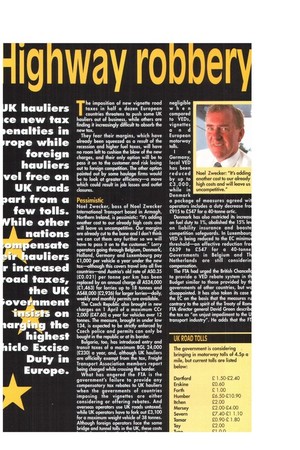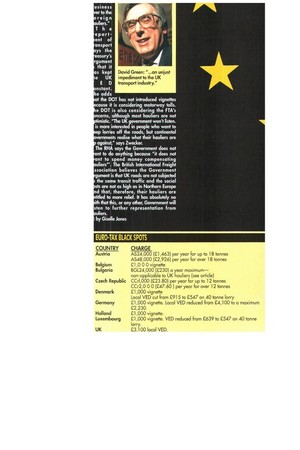1g wayrosser
Page 44

Page 45

If you've noticed an error in this article please click here to report it so we can fix it.
The imposition of new vignette road taxes in half a dozen European countries threatens to push some UK hauliers out of business, while others are finding it increasingly difficult to absorb the new tax.
They fear their margins, which have already been squeezed as a result of the recession and higher fuel taxes, will have no room left to cushion the blow of the new charges, and their only option will be to pass it on to the customer and risk losing out to foreign competition. The other option pointed out by some haulage firms would be to look at greater efficiency—a move which could result in job losses and outlet closures.
Pessimistic
Noel Zwecker, boss of Noel Zwecker International Transport based in Armagh, Northern Ireland, is pessimistic: "It's adding another cost to our already high costs and will leave us uncompetitive. Our margins are already cut to the bone and I don't think we can cut them any further so we will have to pass it on to the customer." Lorry operators going through Belgium, Denmark, Holland, Germany and Luxembourg pay £1,000 per vehicle a year under the new tax—although this covers travel into all five countries—and Austria's old rate of 450.35 (£0.021) per tonne per km has been replaced by an annual charge oi A524,000 (£1,463) for lorries up to 18 tonnes and AS48,000 (£2,926) for larger lorries—daily, weekly and monthly permits are available. The Czech Republic also brought in new charges on 1 April of a maximum CCr 2,000 (£47.60) a year for vehicles over 12 tonnes. The measure, brought in under law 134, is expected to be strictly enforced by Czech police and permits can only be bought in the republic or at its border. Bulgaria, too, has introduced entry and transit taxes of a maximum BGL 24,000 (£230) a year, and, although UK hauliers are officially exempt from the tax, Freight Transport Association members report being charged while crossing the border. What has angered the FTA is the government's failure to provide any compensatory tax rebates to UK hauliers when the governments of countries imposing the vignettes are either considering or offering rebates. And overseas operators use UK roads untaxed, while UK operators have to fork out £3,100 for a maximum weight vehicle of 38 tonnes. Although foreign operators face the same bridge and tunnel tolls in the UK, these costs negligible when compared to VEDs, vignettes and European motorway tolls.
Germany, local VED has been reduced by up to £3,0 0 0, while in Denmark a package of measures agreed wi operators includes a duty decrease fro £915 to £547 for a 40-tonne artic.
Denmark has also restricted its increas on fuel duty to 1%, abolished the 15% le on liability insurance and booste competition safeguards. In Luxembour VED is being reduced to the EC minimu threshold—an effective reduction fro £639 to £547 for a 40-tonne Governments in Belgium and T Netherlands are still considerin compensation. The FA had urged the British Chancell to provide a VED rebate system in t Budget similar to those provided by t governments of other countries, but w disappointed. It has also taken its case the EC on the basis that the measures r contrary to the spirit of the Treaty of Rom FTA director general David Green describ the tax as "an unjust impediment to the U transport industry". He adds that the F
AL
Noel Zwecker: "It's adding another cost to our already high costs and will leave us uncompetitive." usiness er to the reign uliers." The eportent of ansport ys the easury's rgument that it as kept a UK E D nstant. he adds at the DOT has not introduced vignettes cause it is considering motorway tolls. e DOT is also considering the FTAis ncerns, although most hauliers are not timistic. "The UK government won't listen. is more interested in people who want to p lorries off the roads, but continental vernments realise what their hauliers are against," says Zwecker.
The RI-IA says the Government does not ant to do anything because "it does not ant to spend money compensating uliers". The British International Freight ssociation believes the Government gument is that UK roads are not subiected the same transit traffic and the social sts are not as high as in Northern Europe nd that, therefore, their hauliers are tilled to more relief. It has absolutely no ith that this, or any other, Government will sten to further representation from • uliers.
I by Giselle Jones
































































































